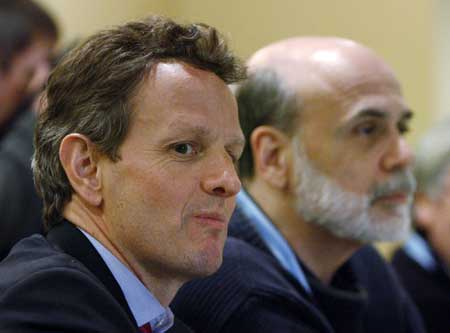Global General
G7 meets in Arctic, euro debt top agenda
(Agencies)
Updated: 2010-02-06 14:31
 |
Large Medium Small |
IQALUIT, Canada - Europe's deepening debt crisis leapt to the top of the agenda of a meeting of G7 rich country finance leaders in the Canadian Arctic on Friday amid fears that Greece's fiscal sickness was spreading.
|
 U.S. Treasury Secretary Tim Geithner (L) and Federal Reserve Chairman Ben Bernanke take part in a meeting at the G7 finance ministers' meeting in Iqaluit, Nunavut February 5, 2010. [Photo/Agencies] |
Canadian Finance Minister Jim Flaherty, host of the meeting, said he and his peers were talking about Europe's problems even before their meeting got underway, with particular concern about the situation in Greece.
World stock markets slid to three-month lows on Friday as the worries intensified about a potentially huge bailout and a destabilization of the euro zone. The euro currency dropped to its lowest since May against the U.S. dollar.
"I think we have to be very mindful of the potential failure of domestic economies and of the persistence of some toxic assets in some banks," Flaherty told reporters.
|
||||
European Central Bank President Jean-Claude Trichet denied speculation in financial markets that the ECB might hold emergency discussions this weekend over the crisis. German Finance Minister Wolfgang Schaeuble said the euro would remain stable despite the problems in individual countries.
"I don't think they have to concoct a bailout, but they do need to show that they are committed to solving the issues," said Kathleen Stephansen, managing director and chief economist at Aladdin Capital Holdings LLC.
"We need to see a show of unity in backing the steps taken by the various government... Saying nothing about it would be negative."
The organizers of the meeting say there will be no communique at the end of their discussions -- in part a reflection of the diminished importance of the G7.
It has been replaced as the main forum for discussing the world economy by the wider G20 group that includes China and other big developing economies. Some officials have suggested this weekend's meeting in Canada might be the group's last before becoming a sub-group within the G20.
The G7 meeting starts with a working dinner featuring local delicacies like caribou and Arctic char and ends with a news conference scheduled for 1:15 pm on Saturday (1815 GMT).
Earlier on Friday, some of the ministers ventured out on dog sleds on Frobisher Bay, a frozen inlet of the Arctic Ocean that fringes this remote and inaccessible town. Iqaluit, home to just 6,000 people, is a three-hour flight from either Ottawa or Montreal and features blocky aluminium-clad buildings set up on stilts to avoid the permafrost.
While most of the fiscal concern was expressed about Greece, the United States and other big economies are also saddled with debts, having spent heavily to stave off a depression in the wake of the 2008 credit crisis.
Ratings agency Moody's Investors Service this week said the United States must do more to keep its AAA rating after the Obama administration said it expected a deficit equivalent to 10.6 percent of gross domestic product in 2010, more than three times the level considered sustainable by economists.
Japan was hit with a warning by Standard & Poor's in January that it might suffer a downgrade over its deficit.
Nonetheless, the G7 ministers were not ready to start scaling back their spending to keep their economies on the road to recovery after the worst global recession in decades.
"We are all agreed that continued stimulus is necessary, that we have not seen entrenched growth, we have not seen an adequate replacement of public demand with private demand," Canada's Flaherty said, adding there was also a concern about the level of public decifits and how to tackle them.
FINANCIAL REFORM
Another key issue is the global push for financial sector reforms.
This was thrown into confusion last month by far-reaching proposals from U.S. President Barack Obama who called for limiting the size of banks, restricting proprietary trading and severing their ties to hedge funds and private equity. That was on top of a previous call for fees on big institutions to recoup the billions spent rescuing the sector.
Flaherty admitted that the approach from different countries was "not entirely consistent," but that was all the more reason for the ministers to get together to talk.
The declining role of the G7 has raised questions on whether the G7, which cut its teeth on efforts to steer currency markets in the eras of Plaza and Louvre accords in 1985 and 1987, remains the right place to discuss currencies.
"It's more fair to debate the yuan at the G20 instead of G7 meetings," Japanese Finance Minister Naoto Kan told reporters before leaving for Iqaluit.










